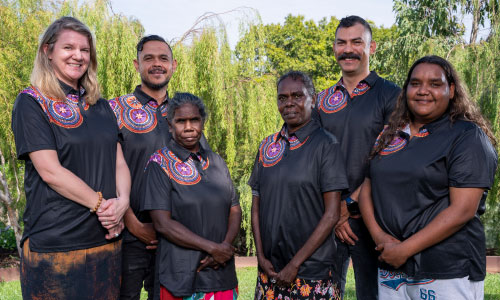16 Days of Activism: Northern Territory Aboriginal Advisory Board on Domestic, Family and Sexual Violence
In response to the need to elevate Aboriginal voices in domestic, family and sexual violence (DFSV) prevention, the Northern Territory (NT) Government established the NT Aboriginal Advisory Board on DFSV. Today, for the 16 Days of Activism, we highlight the crucial role of the Board.
DFSV affects people across all population groups. However, evidence shows that Aboriginal women and children experience disproportionate rates of violence, and that the impacts of this violence are often more severe and complex, due to the ongoing effects of colonisation and systemic racism.
Aboriginal people and communities are best placed to identify and lead solutions that respond to DFSV in their communities. In line with this principle, the Aboriginal Advisory Board provides advice and information to the Minister for Prevention of Domestic Violence on how to improve prevention strategies and better respond to DFSV and its impacts on Aboriginal people and communities. The Board provides information and advice on governance mechanisms, policies and programs, and service delivery.
Learn more about the 9 board members on the Aboriginal Advisory Board website.
In partnership with the Department of Children and Families, Domestic, Family and Sexual Violence Reduction Division, the Board is also supporting a new grant program for Aboriginal-led initiatives that address DFSV. For information on how to apply, go to the Grants NT website.
Board Chair, Lauren Peric, and Board member, Byron May, shared their thoughts with us on the importance of Aboriginal representation in all areas of DFSV prevention, and how everyone must take responsibility to stop the violence.
Q. What action are you taking to try to stop or respond to DFSV?
The Board is active in increasing representation of Aboriginal women, men and families in the DFSV system – in every conversation, every outcome, every initiative and in every piece of advice the Board provides. The Board’s key role is providing advice to the Minister for Prevention of Domestic Violence on how Northern Territory Government DFSV service design and responses can be more inclusive and accessible for Aboriginal people.
The Board also provides advice to other agencies, including NT Health, Commonwealth agencies, and the DFSV Commission, on how essential Aboriginal representation is in the planning and delivery of culturally safe responses to DFSV in the NT.
Q. How would you encourage others to take action to stop DFSV?
It is hard with the high prevalence of DFSV to feel that taking action will make any difference, but it does make a difference. Violence is not part of Aboriginal culture, and action to challenge this misconception and to support individuals and families that are currently experiencing DFSV is important.
It is also important that action and services help family members that have experienced DFSV to heal and stop the cycle of violence. We recognise there are sometimes barriers to action or barriers to accessing support services, but the Board has an Aboriginal-led DFSV Prevention Initiative Grant, which is open to ALL ideas and open to grassroots action in Aboriginal communities.
Q. What message would you like to leave about DFSV?
It will take action and time to stop the violence in all parts of society, including Aboriginal communities. Everyone must play their role and take responsibility to stop the violence.
Support
If you or someone you know is experiencing domestic, family or sexual violence and is in immediate danger, please call 000. For further support, contact the 24hr helplines or support services on the Northern Territory Government website. Other support services and helplines for Aboriginal or Torres Strait Islander people include:

